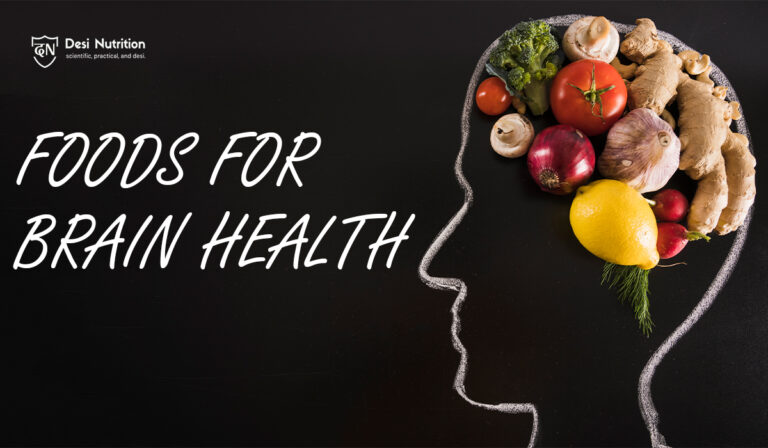The brain is a vital organ that requires all the essential nutrients to function optimally. It not only helps to support memory and focus to potentially protect against age-related cognitive decline. The food that we feed our brain plays a vital role in its optimal function. In this article we will explore foods to support brain health. There are specific nutrients that are found in specific foods that can improve cognitive function, bolster mental clarity and even prevent neurodegenerative diseases.

1. Fatty Fish: Omega-3s for Cognitive Function
Fatty fish, such as salmon, trout, sardines, and mackerel, are rich in omega-3 fatty acids, a type of fat essential for brain function and development. Omega-3s are integral to maintaining the structural integrity of brain cells and play a crucial role in reducing inflammation and oxidative stress, both of which are linked to neurodegenerative diseases.
- Benefits: Omega-3s help support memory, protect against age-related decline, and may improve mood by balancing neurotransmitter function.
- Recommended Intake: Aim for at least two servings of fatty fish per week to reap the benefits of these essential fats.
2. Blueberries: Antioxidants for Memory Support
Blueberries and other dark-colored berries, like blackberries and raspberries, are packed with antioxidants, particularly flavonoids, which have been shown to protect the brain from oxidative damage. These antioxidants neutralize free radicals, which are unstable molecules that can damage cells and accelerate brain aging.
- Benefits: Flavonoids in berries improve neuron communication, enhance learning and memory, and protect against cognitive decline.
- Recommended Intake: Incorporate a handful of blueberries or other dark berries into your daily diet, either as a snack or in smoothies and salads.
3. Leafy Greens: Vitamins for Cognitive Health
Leafy green vegetables like spinach, kale, and Swiss chard are rich in essential nutrients like vitamin K, lutein, folate, and beta carotene, all of which are linked to slower cognitive decline. These vegetables support the production of brain chemicals and protect brain cells from damage.
- Benefits: Vitamin K and folate are particularly beneficial for maintaining neuron health and reducing homocysteine levels, a compound associated with cognitive impairment when elevated.
- Recommended Intake: Aim for at least one serving of leafy greens per day to benefit from these brain-boosting nutrients.
4. Nuts and Seeds: Healthy Fats and Antioxidants
Nuts and seeds, especially walnuts, almonds, chia seeds, and flaxseeds, are excellent sources of healthy fats, antioxidants, and vitamin E, a nutrient that may help prevent cognitive decline. Walnuts are particularly high in DHA, a type of omega-3 fatty acid associated with better cognitive performance.
- Benefits: The healthy fats and antioxidants in nuts and seeds support neuron health and reduce inflammation in the brain.
- Recommended Intake: A handful (about one ounce) of mixed nuts and seeds per day can provide a range of nutrients beneficial for brain health.
5. Whole Grains: Steady Energy for Concentration
Whole grains such as oats, brown rice, quinoa, and barley provide a steady release of glucose to the brain. The brain relies on glucose as its primary energy source, so a consistent supply can support focus and mental clarity throughout the day. Whole grains also contain fiber, B vitamins, and magnesium, all of which contribute to overall brain function.
- Benefits: Whole grains help stabilize blood sugar levels, reduce the risk of inflammation, and support healthy nerve function.
- Recommended Intake: Incorporate whole grains into meals throughout the day, such as oatmeal for breakfast or quinoa and brown rice as part of lunch or dinner.
6. Turmeric: Anti-inflammatory for Brain Protection
Turmeric is a bright yellow spice known for its powerful anti-inflammatory and antioxidant properties. The active compound in turmeric, curcumin, can cross the blood-brain barrier, allowing it to directly benefit the brain. Studies suggest curcumin may boost mood, reduce depression, and stimulate the growth of new brain cells, known as neurogenesis.
- Benefits: Curcumin’s anti-inflammatory properties protect brain cells from damage, potentially lowering the risk of Alzheimer’s disease and other cognitive disorders.
- Recommended Intake: Add turmeric to meals or consider taking it as a supplement, but be sure to consume it with black pepper to enhance absorption.
7. Eggs: B Vitamins and Choline for Memory and Mood
Eggs are rich in several nutrients essential for brain health, including B vitamins (B6, B12, and folate) and choline. Choline is a precursor to acetylcholine, a neurotransmitter involved in memory and cognitive function, while B vitamins are crucial for energy production and may slow age-related brain shrinkage.
- Benefits: Choline helps improve memory and cognitive processing, while B vitamins help reduce levels of homocysteine, a marker linked to cognitive decline.
- Recommended Intake: Including eggs in your diet a few times a week can provide a solid source of these brain-supportive nutrients.
8. Broccoli: Antioxidants and Vitamin K for Brain Function
Broccoli is packed with antioxidants, vitamin K, and compounds known as glucosinolates. Vitamin K is crucial for the formation of sphingolipids, a type of fat found in brain cells, while glucosinolates may have a protective effect on brain cells by reducing oxidative stress.
- Benefits: These nutrients support cognitive function and have been linked to improved memory and sharper thinking.
- Recommended Intake: Enjoy a serving of broccoli a few times per week, either steamed, roasted, or in stir-fries.
9. Dark Chocolate: Flavonoids for Enhanced Cognitive Performance
Dark chocolate contains brain-supportive compounds like flavonoids, caffeine, and antioxidants, which enhance cognitive function and reduce mental fatigue. The flavonoids in dark chocolate are known to stimulate blood flow to the brain, improving focus and attention.
- Benefits: Flavonoids help improve brain plasticity, which is essential for learning, and caffeine provides a short-term mental boost.
- Recommended Intake: Choose dark chocolate with at least 70% cocoa content and enjoy a small square as a daily treat to support brain health.
10. Coffee and Green Tea: Caffeine and Antioxidants for Focus
Both coffee and green tea contain caffeine, which temporarily boosts alertness, focus, and cognitive function. Green tea also contains L-theanine, an amino acid that promotes relaxation without drowsiness, providing a calming yet mentally stimulating effect.
- Benefits: The combination of caffeine and L-theanine in green tea supports concentration, while the antioxidants in both beverages help reduce inflammation.
- Recommended Intake: Moderate caffeine intake, typically around one to two cups of coffee or green tea daily, can provide cognitive benefits without negative side effects.
11. Oranges: Vitamin C for Brain Protection
Oranges and other citrus fruits are rich in vitamin C, an antioxidant that plays a critical role in brain health by reducing oxidative stress and supporting immune function. Vitamin C may protect against age-related cognitive decline and improve memory by supporting brain cells.
- Benefits: Vitamin C acts as an antioxidant in the brain, scavenging free radicals and reducing inflammation, thereby supporting long-term cognitive function.
- Recommended Intake: A medium-sized orange provides more than 100% of the daily recommended intake of vitamin C, making it an easy and delicious way to boost brain health.
Practical Tips for Adding Brain-Boosting Foods to Your Diet
Adding these brain-supportive foods into your daily meals doesn’t have to be challenging. Here are some simple ways to start:
- Smoothie Boost: Blend blueberries, leafy greens, and chia seeds into your morning smoothie for a nutrient-packed start to the day.
- Brain-Healthy Breakfast: Try oatmeal with walnuts and dark chocolate shavings, or scrambled eggs with a sprinkle of turmeric for a brain-boosting breakfast.
- Balanced Lunch and Dinner: Include a source of fatty fish like salmon, steamed broccoli, and whole grains like brown rice in your meals for comprehensive brain nutrition.
- Snack Wisely: Reach for nuts, seeds, or an orange for a mid-day snack that supports cognitive function.
Frequently Asked Questions
How to make your brain strong?
Ans. To make your brain strong remember to feed it good food which is nutrient-rich so it can function optimally. Apart from that make sure you exercise regularly. Exercising is also a fuel for your brain. Prioritize your sleep for effective results and make sure you are mentally active by involving yourself in various activities like socializing, traveling, playing with kids or pets.
How can I sharpen my memory?
Ans. To sharpen your memory you will have to focus on eating nutrient-rich food and also stay physically and mentally active everyday. Exercise daily or include physical activities that will help you to stay physically active. Start by doing the things that you love.
Which food is good for studying?
Ans. Foods like nuts, seeds, fruits, fruit, dark chocolate, eggs, cheese, Greek yogurt etc are good for your brain to help you study.




